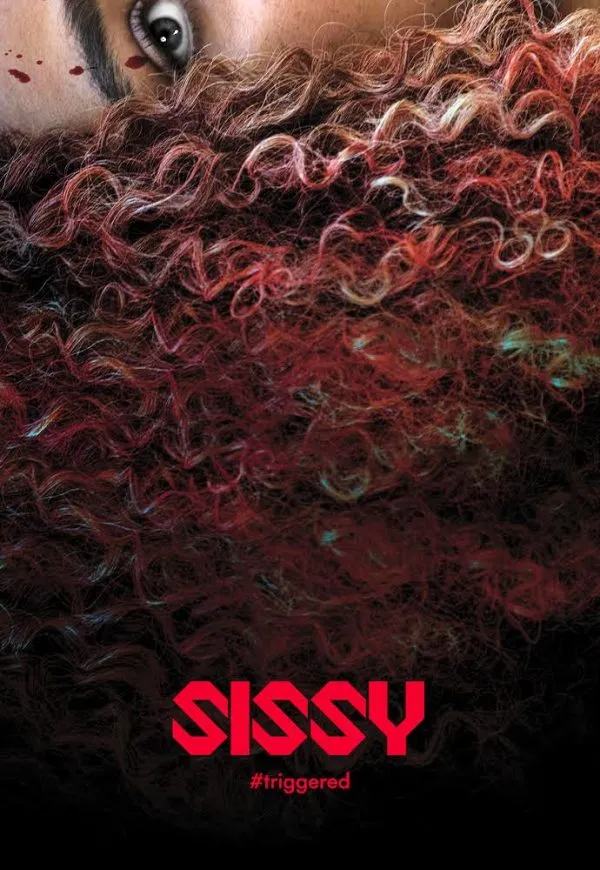By Thomas M. Puhr.
Sissy satisfies on most fronts, eliciting shocked guffaws and legitimate scares in equal measure. It’s easy to imagine it one day becoming something of a cult classic.”
Cecilia seems to have it all. Her mental health video podcast, “Sincerely, Cecilia” – which includes episodes with titles like “Making Friends with Hyperventilation” – has more than 200,000 followers. Online acquaintances include the likes of Chris Hemsworth (or at least his PR people). She chants her saccharine tagline – “I am loved. I am special. I am enough. I am trying my best. We all are.” – whenever the going gets tough. She is, in short, the embodiment of the vapid internet “influencer.” Who is she influencing, exactly? Who knows, and who cares? All that matters are the adulations her anonymous fans send whenever she posts an update.

This shiny veneer of put-togetherness is pulled out from under us within the opening minutes of Hannah Barlow and Kane Senes’ wickedly funny Sissy (2022). When Cecilia’s latest video ends, the writer-directors reveal the lonely life she leads just outside the frame. Tightly closed curtains. Dirty dishes piled in the sink. Cold pizza for breakfast, with some reality TV on the side. Granted, influencer culture is an easy target – and these opening scenes’ potshots practically write themselves – but actress Aisa Dee imbues the protagonist with genuine pathos. We feel for her, despite the cloying online persona (she would seem cartoonishly unrealistic if her real-life counterparts weren’t so easy to spot). Despite the fact, as the film progresses, that something is very wrong with her. Dangerously wrong, in fact.
Cecilia’s life begins to unravel when she runs into estranged childhood friend Emma (Barlow). The two were thick as thieves in middle school, recording home movies (perhaps a precursor to Cecilia’s later career choice?) and burying – with promises of beings “best friends forever” – a time capsule in their school’s playground. Things took a turn, however, when Alex (played as an adult by Emily De Margheriti) came along and “stole” Emma from Cecilia (she also gave her the diminutive, titular nickname). Now, all these years later (and after an intriguingly vague “accident” ended the friendship once and for all), Emma is getting married and invites Cecilia to her bachelorette party. Naturally, this gesture toward rekindling the friendship doesn’t go as planned.
If all of this sounds familiar, you may be thinking of the wonderful Ingrid Goes West (2017), another satire that took aim at influencer culture by way of a troubled protagonist’s pathological obsession with social media fame. But Barlow and Senes add the welcome twist of mixing some genuinely upsetting horror into their entry to the ever-expanding subgenre. Since the abovementioned bachelorette party occurs at Alex’s secluded cabin in the Australian wilderness, it should come as no surprise that bodies start piling up in increasingly bloody fashion once the festivities begin.
The result is a clever crossbreed between social satire and rough-around-the-edges slasher. Imagine if Ben Wheatley directed Ingrid Goes West after giving the screenplay a once over, and you’d be getting close to what we have here. Sissy, in fact, features some of the nastiest kills this side of Wheatley’s Sightseers (2012), and the first-time feature directors prove adept at eliciting uncomfortable laughs from some truly repulsive moments of violence. Fans of the genre will appreciate their use of some old school practical effects (like some of their contemporaries, they seem determined to come up with new, nausea-inducing ways to smash a character’s head in).

The extent to which you’ll enjoy Sissy depends on your willingness to follow the directors into some pretty nasty (and borderline meanspirited) territory. Those who do so will be rewarded, however, with a narrative that pays due respect to its influences while winking at the familiar tropes. Consider a sequence in which the gang drives toward their weekend getaway. After crashing into a kangaroo that hops in front of their van (roadkill is almost always a portentous event in these films, as fans of The Texas Chain Saw Massacre can attest), they arrive at the secluded cabin. It’s an amusing contrast, seeing the happy twenty-somethings pulling up to the house with a shattered windshield and blood-spattered hood; they seem blissfully unaware that they’ve stumbled into a horror film.
If Sissy occasionally risks dipping into smug nihilism, the care with which Barlow and Senes crafted it elevates the proceedings. They do not use self-awareness as an excuse to be lazy in execution, and their visuals are often quite arresting. Consider, for instance, a dissolve from an extreme close-up of glittery nail polish to a star-studded night sky. Such flourishes are not just beautiful to look at in their own right but indicative of the extent to which Cecilia’s deluded worldview has spilled over from her podcast and into her day-to-day life. Everything – her friends, their interactions, and even the weekend’s traumatic events – is seen as little more than fodder for her to exploit for likes and emojis of encouragement.
Sissy satisfies on most fronts, eliciting shocked guffaws and legitimate scares in equal measure. It’s easy to imagine it one day becoming something of a cult classic – one which held an unflinching mirror up to our online persona-obsessed zeitgeist.
Thomas Puhr lives in Chicago, where he teaches English and language arts. A regular contributor to Bright Lights Film Journal, he has published “‘Mysterious Appearances’ in Jonathan Glazer’s Identity Trilogy: Sexy Beast, Birth and Under the Skin” in issue 15.2 of Film International.

